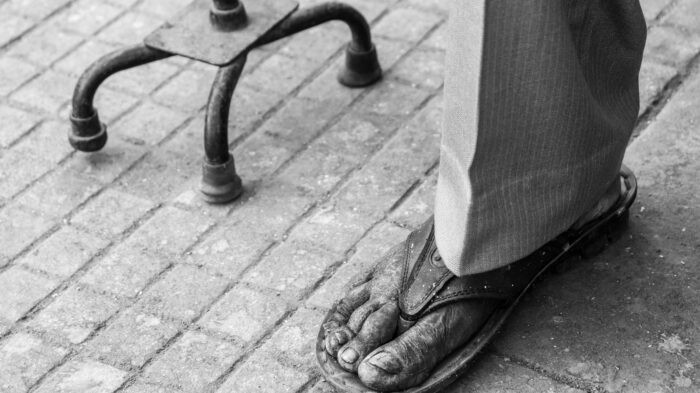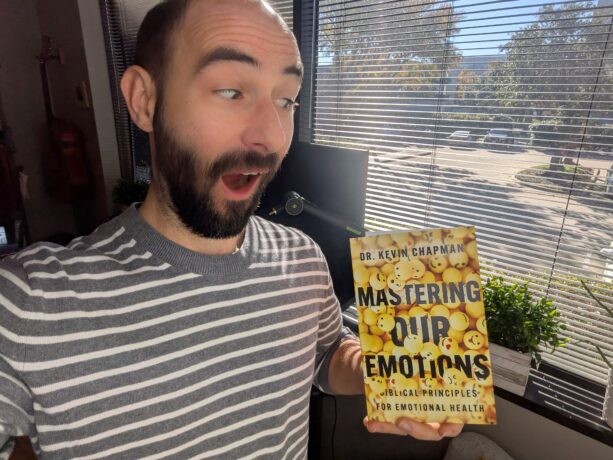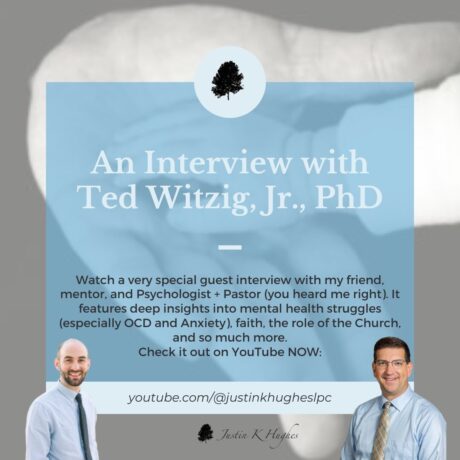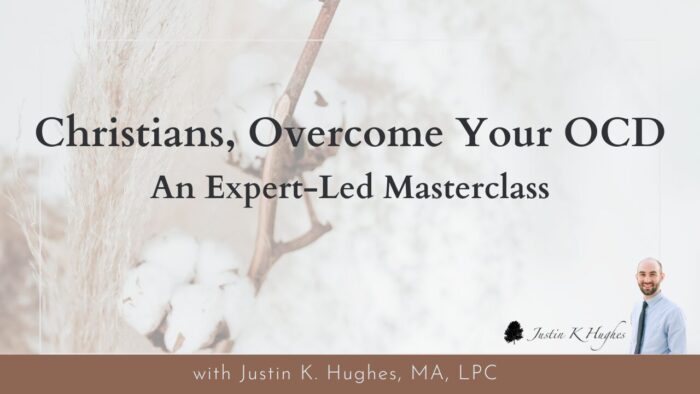Justin’s Blog: “The Jog”
120+ Articles Driven by Research and Practice
When the Spikes Strike…at Church—Guest Article by Meghan Newkirk
People who have obsessive-compulsive disorder (OCD) experience severe distressing intrusions, sometimes called “spikes” by sufferers. These can happen in the place most unwanted, including holidays, birthdays, funerals, job interviews, weddings, and sacred spaces like a church. What if these thoughts aren’t a reflection of character or faith? What if you can find peace by tools […]
Read More >What are reasons why Christians don’t pursue therapy? (ChatGPT’s Response)
This is fascinating. I gave into the pop-culture urge of asking ChatGPT for its feedback on why Christians don’t pursue therapy. Its feedback wasn’t bad. What do you think? ChatGPT on Christian avoidance of therapy—Helpful or Hurtful? Here is my prompt: What are reasons why Christians don’t pursue therapy? There are several reasons why […]
Read More >Is Faith Helping or Hindering Your Recovery—Your Anxiety Toolkit podcast guest
As many people search for meaning and answers to suffering, questions of faith and spirituality are being asked with renewed fervor. It is no surprise to me that these topics are critical in mental health care and treatment. Yet, few know how to navigate them well. I hope you’ll listen to Kimberley Quinlan’s Your Anxiety […]
Read More >A Deeper Dive into the role of faith (Christianity) in OCD treatment—the OCD Stories #487
Stuart Ralph is an acclaimed podcast host of the OCD Stories who has both lived experience and expertise as a clinical specialist in the treatment of OCD. Being the most popular podcast dedicated to OCD by far, he has over 7 Million listens from around the world. His podcast is my favorite to share with […]
Read More >The History of OCD—Out Now on YouTube
Why is Obsessive Compulsive Disorder (OCD) such a new phenomenon? Well, it’s not. We have clues about many in history who have suffered, from St. Ignatius to Loyola to Martin Luther. It is a fascinating history, which is church history. ⛪ Click Here to Watch the Short Video now, which is a free sample from […]
Read More >Out NOW! The Peace of Christ: Effective Ways to Overcome Anxiety and OCD
Did you miss the webinar? No problem! Here’s the recording on YouTube and the summary from Mental Health Grace Alliance: Justin Hughes, LPC, explains how anxiety and OCD get filtered through the Christian perspective and general strategies for overcoming. Resources and links in the video: Understanding the Overactive Conscience Is it God or my […]
Read More >The Peace of Christ: Effective Ways to Overcome Anxiety and OCD [Free Webinar this week only]
This Friday! Join us for a webinar by The Mental Health Grace Alliance. The Peace of Christ: Effective Ways to Overcome Anxiety and OCD Apr 25, 2025 10:00 AM CST Click HERE to sign up now! “In this powerful webinar, licensed professional counselor (LPC, MA) Justin Hughes will explore how anxiety and OCD affect […]
Read More >Danny Gokey Breaks Silence Over His Struggle with Scrupulosity!
Popular recording artist Danny Gokey recently shared his battle with OCD (scrupulosity), AD/HD, trauma, and depression. This comes as Braden Smith (Offensive Tackle for the Indianapolis Colts) recently detailed his severe struggle with OCD. I hope you are encouraged to hear stories that make tangible the 3% of those who have (or will have) OCD […]
Read More >Have Mercy on Those Who Doubt
If you have an Anxiety disorder or OCD, there are factual, verifiable differences in your experience with fear, uncertainty, and doubt. Many of my clients feel extra shame that they can’t overcome their doubts quickly through faith. IMPORTANT: God sees that some struggle more with doubt. Does God shame us out of it? No. He […]
Read More >Don’t Suffer Alone—Mental Health Grace Alliance
None of us recovers alone. The role of community in our support is more crucial than any of us knows. If you struggle with mental or emotional health (i.e., you are human), going it alone is not an option, yet most of us choose this at various points in our suffering. Therapy, unchecked, is at […]
Read More >Mastering Our Emotions by Dr. Kevin Chapman—Book Review
Dr. Kevin Chapman caught my attention several years ago with his engaging mix of psychology credentials and faith. He has been a “friend at a distance,” offering kind words and encouragement to me on the regular. I recently reviewed his brand new book, which is out this month, and my review is below. Mastering Our […]
Read More >Living a Devotional Life When Suffering from OCD
The suffering of OCD can be so intense and overwhelming that focus on nearly anything that doesn’t demand attention can be difficult. One of the many impacts can be struggling to keep up (or start) a devotional life—living day-by-day in devotion to God. I will stay simple here and say flexibility is critical. God knows […]
Read More >An Interview with Pastor and Psychologist, Ted Witzig, Jr., PhD
There’s a pastor who is also a psychologist specializing in treating OCD. You read that right. What seems a bizarre combo at its heart isn’t unusual at all. Sure, in all fairness, he is the only person I know who has that mix. But he’s not the only person by far with a mixture of […]
Read More >Courageous Callings and OCD—by Author Kathrine Snyder
Around here, I’m all about helping people get unstuck. It is a joy to elevate voices of hope. Today’s guest article is by my friend and the author, Kathrine Snyder, who also wrote a book (see at the end). She’s one of the many courageous voices that have impacted my own journey. If you’re looking […]
Read More >Christians, Overcome Your OCD: An Expert-Led Masterclass
Christians, Overcome Your OCD is the step-by-step, proven process of recovery and faith that will save months—and even years—in discovering how you can find freedom from OCD. You can subscribe directly to the course newsletter or visit the course page to learn more and get a free trial and Exposure and Response Prevention worksheet today! […]
Read More >















